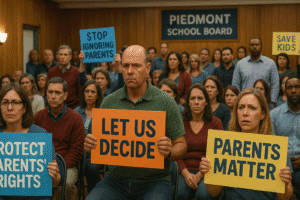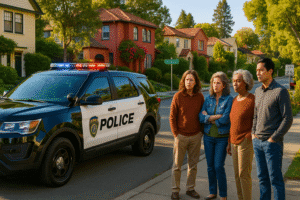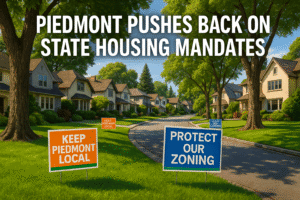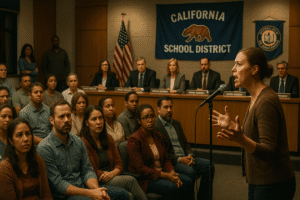Piedmont City Council Faces Crucial Decisions on Affordable Housing and Zoning: A Community at a Crossroads


Piedmont, CA— At the most recent Piedmont City Council meeting, a packed chamber bore witness to a heated yet civil debate over a subject that has come to define not just the city, but the entire Bay Area: affordable housing and local zoning reform. As state mandates and regional pressures converge, Piedmont’s leadership and residents are reckoning with decisions that will shape the city’s character for decades to come.
Setting the Stage: State Mandates and Local Realities
The meeting, held in the historic Council Chambers at City Hall, opened with a presentation from city staff on the latest requirements from California’s Regional Housing Needs Allocation (RHNA). Under state law, Piedmont must identify and plan for the development of hundreds of new housing units—including a significant portion designated as affordable—over the next eight years.
City Manager Sara Lillevand summarized the challenge: “Piedmont is a built-out, largely residential community with limited space for new development. But we are not exempt from the housing crisis affecting our region. We must do our part.”
The Proposed Zoning Amendments
The centerpiece of the evening was the proposed set of zoning amendments intended to facilitate multifamily housing and accessory dwelling units (ADUs), in compliance with state law and the city’s adopted Housing Element. The amendments would allow for denser development along key corridors, reduce parking minimums, and streamline the approval process for certain projects.
City Planner Kevin Jackson explained, “We have identified a number of sites—some city-owned, others privately held—that could accommodate new multifamily units. The proposed changes will provide the flexibility needed to meet our RHNA targets while preserving the unique character of Piedmont.”
Community Voices: Concerns and Support
As public comment opened, dozens of residents stepped to the microphone. The diversity of opinions reflected the complexity of the issue.
Opposition and Concerns
Many long-time residents expressed concern about the impact of increased density on Piedmont’s small-town feel, traffic congestion, and school capacity.
“I moved here because of the quiet neighborhoods and excellent schools,” said resident Barbara Wu. “We all want to help solve the housing crisis, but not at the expense of what makes Piedmont special.”
Others worried about the potential for “overdevelopment” and questioned whether affordable units would actually be affordable to lower-income families.
Support and Urgency
Yet, a sizable contingent urged the council to act boldly, emphasizing the moral and practical imperatives of expanding housing opportunities.
“Young families, teachers, and essential workers are being priced out of our community,” said Jonathan Perez, a local teacher. “If we don’t build more affordable homes, Piedmont will become even more exclusive and less diverse.”
Several speakers referenced the city’s own diversity, equity, and inclusion goals, arguing that meaningful action on housing was necessary to live up to those values.
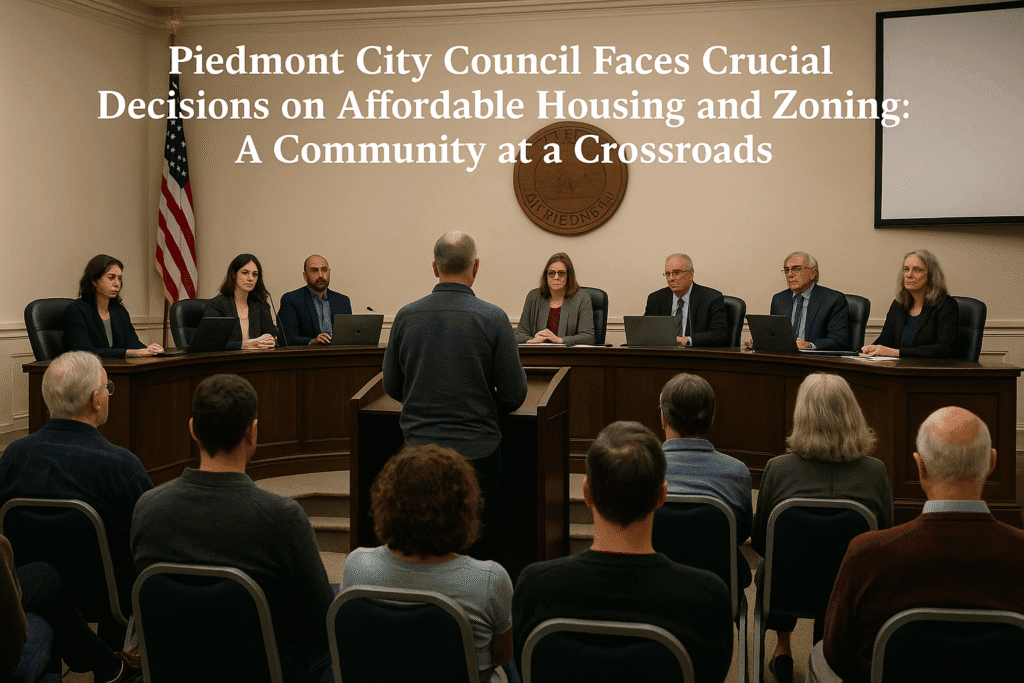
Council Deliberation: Seeking Common Ground
After nearly two hours of public comment, the council turned to deliberation. Councilmember Jennifer Cavenaugh acknowledged the tensions but emphasized the need for compliance with state law.
“We are not being asked whether to build more housing—state law is clear,” she said. “The question before us is how to do it thoughtfully and in a way that serves Piedmont’s current and future residents.”
Councilmember Tim Rood, an urban planner by profession, highlighted examples from other cities that have successfully integrated new housing while maintaining community character. He advocated for robust design guidelines and community engagement as the process moves forward.
Mayor Betsy Andersen sought to bridge the divide: “We hear the concerns about traffic, schools, and neighborhood character. But we also hear the urgent need for more housing, especially for families and workers who contribute so much to our city. Our job is to find a balanced path forward.”
Key Decisions and Next Steps
In a series of 4-1 votes, the council approved the following measures:
- Adoption of revised zoning ordinances enabling multifamily housing on select parcels and reducing barriers to ADU construction.
- Initiation of a design review process to ensure new developments are compatible with existing neighborhoods.
- Commitment to ongoing community engagement, including workshops and surveys, as projects move from planning to implementation.
The lone dissenting vote, Councilmember Conna McCarthy, explained her position: “This is not about opposing affordable housing. It is about making sure we have the infrastructure and resources to support it.”
Broader Implications: Piedmont as a Microcosm
Piedmont’s housing debate is emblematic of challenges facing cities across California. State officials, including Governor Gavin Newsom, have made clear that localities must do more to address the chronic housing shortage. Failure to comply can result in loss of local control and even litigation.
At the same time, many communities—especially those with high property values and limited land—struggle to reconcile state mandates with cherished local traditions and quality of life concerns.
Urban policy expert Dr. Karen Chapple of UC Berkeley commented, “Piedmont’s experience shows the importance of thoughtful planning, transparency, and community involvement. There will always be trade-offs and disagreements, but doing nothing is not an option.”
Looking Ahead: A Community in Transition
As the meeting adjourned, it was clear that the conversation was far from over. The coming months will see further debates about specific sites, project designs, and the allocation of city resources to support new residents.
For many, the evening felt like a turning point. “We’re at a crossroads,” said resident and housing advocate Maria Gutierrez. “We can choose to open our doors and shape change, or we can resist and have it imposed on us.”
The city’s leadership pledged to keep residents informed and involved at every step. Mayor Andersen concluded, “This is not an easy path, but it is a necessary one. Together, we can ensure Piedmont remains a vibrant, welcoming community for generations to come.”
For more information on upcoming city meetings and housing policy updates, visit Piedmont’s official website.




